Hope Doesn’t Pay
This last month has brimmed with all sorts of action: travels, presentations, writing deadlines, appointments, and meetings.
It hasn’t been bad, just busy. Super super busy.
As it is, though, the primary work that I do covets long stretches of time to read, process, think, and write.
I haven’t had much of that, which largely explains why I haven’t blogged since my last post about the Minnesota Twins, who, let’s be clear, not only brought us further this season than expected and hoped, but were obviously using this season in part to, um…to simply warm up for next season.
Ahem.
Now, though, there’s a long litany of blog topics cropping up, getting longer by the (rapidly changing news) day and even (rapidly changing news) minute.
But when I was informed, the other day, that hope doesn’t pay, well…the blog topic was simultaneously given, and the title wrote itself.
~~~~~
It was a phrase that I heard at one of the many meetings held this past month, as the school district, the State, and I begin to discern what is next for my son Karl. (It is quite worth mentioning that at this very table sat our county social worker, for whom I am running out of glowing adjectives and metaphors: rock star, hero, life-saver…She has been and continues to be a gifter of tangible hope for my family. She gets the complicated System, and she gets that I am complicated, and somehow sorts it all out with grace, vision, integrity, and perfect solutions. Having her in my world helps me sleep, no joke).
Technically Karl could graduate this year, but because of his TBI, technically he can also stay at the school until age 21, if it is deemed that further education would benefit Karl as he transitions into adulthood.
That there is no clear, uniform metric to determine how, exactly, this decision is made, and who ultimately makes it, is a minor quibble [insert hair-tearing-out emoji, were there one. Please someone make one, because I could use it pretty much every day in my dealings with this process that, on the fun scale, isn’t to be found].
Part of the process at hand, then, involves people from a department within the State’s Human Services called “Vocational Rehabilitation,” or “Voc Rehab” for short. They are charged with observing Karl in different contexts—familiar and new—and then drafting a report on their findings.
The stated goal is to discover suitable vocational possibilities for people with some sort of disability.
So over the course of a couple of months, a very kind gentleman from Voc Rehab spent several hours with Karl in various spots: Here at home, taking him to a local retirement community, in our church, at school.
He took pictures of Karl in all of these locales, but I’m just going to show you two, the second of which is snapped from a video:
First, this one:
Here, Karl is proudly giving the gentleman a tour of his high school, and he is obviously so very pleased to show off his locker and to have the responsibility of being the Official Guide.
But here, he’s at home, helping to make granola breakfast treats.
Do you see the difference?
In the first picture, he’s grinning ear-to-ear. Beaming, really, with delight and pride.
In the second, he’s not even looking at the task at hand. In the video, Karl smiled when something funny happened to a glop of honey, but (especially if you know Karl) when you get right down to it, he knows that doesn’t really even need to be there.
The task could be done without him, and that point is not lost on Karl.
This is not to cast any aspersions on his amazing PCA Ash, of course!
It’s rather to point out something that all who know Karl know about him: he is happiest when he is actively engaged in relationships. He loves making people feel welcome. He loves giving joy. His very being is, in fact, about inspiring hope.
In fact, under the rubric of a full-on brag, just two days before the meeting which moved me to write this blog took place, we celebrated with Karl his triumphant honor of receiving an award for which he was nominated by his hospital-based occupational therapist. In his letter lifting up Karl’s name, Jason wrote that my son inspires hope and offers contagious joy to all who met him, all the more when a person knows his story.
Obligatory pics:
I so get to be his mama.
So this hope/joy thing about my boy, I’m not making it up. As my father has been known to say, [insert deep, robust voice that echos like sounds do in the Grand Canyon] “All parental bias aside, my child is quite remarkable.”
ANYway, fast forward to this table at which several people were gathered two weeks ago to process Karl’s vocational possibilities.
So, thanks to their observations, it was noted that Karl likes baseball (I am so raising him right), and power wheelchair soccer (he won an award last year for his efforts and his “Dodgeball Prowess”), and Wii baseball, bowling, and golf (true story: when he plays, we have to wrap him in pillows, blankets, and everything short of bubble wrap, because he gets so into the game that he bruises himself with the momentum of his pitches/at-bats/throws/swings, so much so that I’ve had to explain in advance that these are athletic injuries: he’s really not getting abused at home, honest).
Hmmm. So, it was suggested, maybe he could help out with athletic events? Selling tickets, handing out programs?
Great idea, well-intentioned too, and really, as I said then, it points out something hidden in plain sight…except that people with TBIs—certainly this child of mine with a TBI—can’t do sustained loud noises, nor late nights; Karl’s brain is so tired from just daily life that he’s often in bed by 8:00, which is convenient, because that’s exactly when I want to be happily in bed reading too.
Large groups of enthusiastic fans in enclosed spaces (thank God Minnesota baseball is played outside again!) playing games that start at 7:05 p.m., then…not great.
How about, then, greeting streams of random people at a store?
Paper shredding?
(*mama begins looking for above-referenced hair-pulling-out emoji*)
So, admittedly with some impatience, I pointed out the difference between these two pictures.
I told the story of Karl’s recent award, and explained that, despite the trauma of the accident, Karl is and always has been all about spreading joy.
He simply loves making people glad!
He hugs his bus driver and the assistant before the morning drive, he shakes the hand of people who come through the Communion line at our congregation in Duluth, (people seriously change their course en route to getting the body and blood of Jesus because they meet Jesus in Karl’s gladness to see them), he notices when someone is sad and asks after them, he delights in bringing someone a surprise, a cookie, a present.
Karl loves, that is, nothing more than offering joy and hope to people.
And people love Karl for it, and love their days better because Karl has been in them.
So why, I asked, is it that everything that is being recommended for Karl—and for many people with disabilities—task oriented?
Again, Hmmmmmm.
So it basically boils down to this: the goal of this process seems to be less about discovering a vocation [the name of the group notwithstanding] and more about seeking “competitive employment” for people with special needs which in turn seems to boil down to making the main employment goal for people with disabilities be the making of money and living independently…which Karl will never be able to do.
In other words, when push comes to shove, at the end of the day, really, we are not looking for a vocation for Karl.
We’re looking at finding him a job.
Because that’s all that is yet systemically imaginable: not a vocation, but a job, a task, for Karl.
That’s messed up.
~~~~~
The whole undergirding philosophy became crystal clear when, after my repeated proddings to expand the thinking, to be creative, to pursue other options, one of the people at the table said that to find employment such as the ones I was trying to suggest is “out of their wheelhouse.”
And then, in the next breath, came the kicker: she said, “Anna, you are all about joy, and you are all about hope, and that’s all fine and good, but here’s the thing: hope doesn’t pay.”
Low. Whistle.
(And an immediate realization that my next blog had just been presented on a silver platter)
Of course, I bristled (I confess that experience has lent me to come to these sorts of conversations pre-bristled), but you know what?
She’s right.
Hope often doesn’t pay.
The sorts of ideas that I was putting forward for Karl that offered him a sense of personal accomplishment, and meaning, and purpose, and inner-resonance, are not “tasks” that can be easily commodified.
Instead, they were ones that a person who might need them can get for free, by way of volunteers.
Indeed, Karl and other students in his classroom are getting ‘work experience’ now in a very fine cooperative arrangement with a local agency that attends to the needs of the aging population along the North Shore.
With assistance, Karl can visit people who can’t easily get out, can get and deliver groceries, and can play games with groups of senior citizens.
But it worth noting that these needs are presently largely met by way of volunteers.
And so…she’s got a point.
Why pay someone when it can be gotten for free?
Why pay someone for being an ambassador of hope and joy?
To answer this question, I put to work my dual callings as mama of Karl and as public theologian, and began to reflect on the notion of vocation, and came up with a few observations:
1) Volunteers tend to be those who, in some way(s), are secure:
Volunteers are able to volunteer because they do not need the income they could be otherwise getting, because they have extra time, because they are, in any number of ways, able to volunteer.
This observation in no way is meant to diminish the amazing benevolence that volunteers give to the world!
Volunteers could be doing a zillion other things with their time, and instead they are donating it to a bigger, broader cause.
One could say that they are stewarding their security, and the world is therefore a better place.
So I do not at all mean to insult volunteers!
Instead, I am simply pointing out that one doesn’t volunteer if one needs to work to survive instead.
2) There is a difference between vocation and avocation.
A vocation is a calling, quite literally: the word comes from the same Latin root from which we get vocal. It is more than a job; it’s an occupation that gives meaning to the one engaged in it and who receives the efforts of the same.
In this sense, all forms of higher education are ‘vocational schools,’ ideally, training people for an occupation that builds on their gifts and skills and transforms them into work that serves other people.
And, ideally, it’s what we all want to have, and want our beloveds to have: meaningful work.
An avocation, though, literally means “not a calling.”
More precisely, though, it means ‘not work.’
It references something that is done for fun, like a hobby, or an enjoyable activity done in one’s spare time.
Volunteering, arguably, is a kind of avocation.
To boot, what might be an avocation to one person might, in point of fact, be a vocation for another.
Think of those who knit, who take photographs, who play piano. Some engage these activities professionally, and others do so on a lazy afternoon just because.
3) A vocation is something that a person can do uniquely to serve the neighbor, to make the world a better place.
Douglas Shuurman, in his book Vocation: Discerning our Callings in Life writes:
Because, like Christ, Christians are to love the world and be agents of its redemption, God’s callings also relate to human needs, whether those needs are in the church or beyond it. When a Christian perceives a genuine human need and has the abilities needed for attending to it, that need becomes a spark of God’s calling to him. To the extent that the duties of one’s many places of responsibility also contribute to meeting human needs, those duties also are God’s callings (39).
In other words, ideally, a vocation is a role in and for the broader world that one can do precisely because of who one is.
So consider what you do, or what you did do, for your vocation. Hopefully, it gave you some measure of satisfaction, of delight, of meaningfulness.
Now imagine being told that instead you must shred paper, or greet random people, or research, or fix refrigerators, or teach…or if you shred paper, greet, research, fix refrigerators, or teach, that you instead now must farm, or be a cashier, or make art.
You’d recoil, right?
You would, because you know that you are many things, but you are not that…whatever the alternative ‘that’ might be.
With all due respect for those who engage in these other vocations, these vocations are not your vocation, and so you are happy to let them do their thing, so that you can do yours.
And they feel the same about you.
4) But a vocation is something that ought to be sustaining not just personally and spiritually, but financially too.
The case has been made that it’s a mark of privilege to even talk about vocation in terms of a call vs. a job.
It’s true.
But it shouldn’t be.
It is simply true that by living in community—which we all are—we need each other.
This is not the stuff of idyllic schmarminess.
It’s truth.
Even I, who lives in the woods with my own well and my own septic tank and my own wood heat and my own garden, need roads and health care and milk [and I am not getting a cow…though I have thought about chickens] and people to test my well and clean out the slurry and bring me wood and send me the seeds I want and need.
We all need people to do the things we can’t do.
It’s the basic stuff of 1 Corinthians 12:
12 Now concerning spiritual gifts, brothers and sisters, I do not want you to be uninformed. 2 You know that when you were pagans, you were enticed and led astray to idols that could not speak. 3 Therefore I want you to understand that no one speaking by the Spirit of God ever says “Let Jesus be cursed!” and no one can say “Jesus is Lord” except by the Holy Spirit.
4 Now there are varieties of gifts, but the same Spirit; 5 and there are varieties of services, but the same Lord; 6 and there are varieties of activities, but it is the same God who activates all of them in everyone. 7 To each is given the manifestation of the Spirit for the common good. 8 To one is given through the Spirit the utterance of wisdom, and to another the utterance of knowledge according to the same Spirit, 9 to another faith by the same Spirit, to another gifts of healing by the one Spirit, 10 to another the working of miracles, to another prophecy, to another the discernment of spirits, to another various kinds of tongues, to another the interpretation of tongues. 11 All these are activated by one and the same Spirit, who allots to each one individually just as the Spirit chooses.
12 For just as the body is one and has many members, and all the members of the body, though many, are one body, so it is with Christ. 13 For in the one Spirit we were all baptized into one body—Jews or Greeks, slaves or free—and we were all made to drink of one Spirit.
14 Indeed, the body does not consist of one member but of many. 15 If the foot would say, “Because I am not a hand, I do not belong to the body,” that would not make it any less a part of the body. 16 And if the ear would say, “Because I am not an eye, I do not belong to the body,” that would not make it any less a part of the body. 17 If the whole body were an eye, where would the hearing be? If the whole body were hearing, where would the sense of smell be? 18 But as it is, God arranged the members in the body, each one of them, as he chose. 19 If all were a single member, where would the body be? 20 As it is, there are many members, yet one body. 21 The eye cannot say to the hand, “I have no need of you,” nor again the head to the feet, “I have no need of you.” 22 On the contrary, the members of the body that seem to be weaker are indispensable, 23 and those members of the body that we think less honorable we clothe with greater honor, and our less respectable members are treated with greater respect; 24 whereas our more respectable members do not need this. But God has so arranged the body, giving the greater honor to the inferior member, 25 that there may be no dissension within the body, but the members may have the same care for one another. 26 If one member suffers, all suffer together with it; if one member is honored, all rejoice together with it.
27 Now you are the body of Christ and individually members of it. 28 And God has appointed in the church first apostles, second prophets, third teachers; then deeds of power, then gifts of healing, forms of assistance, forms of leadership, various kinds of tongues. 29 Are all apostles? Are all prophets? Are all teachers? Do all work miracles? 30 Do all possess gifts of healing? Do all speak in tongues? Do all interpret? 31 But strive for the greater gifts. And I will show you a still more excellent way.
Point is, the variety of specific vocational work that needs to be done is inherently valuable, if for no other reasons than that we can’t do it all, and don’t want to either.
Moreover, the specific people—all the specific people—who do the specific vocational work are inherently valuable.
And we—all of us—and our vocational work should be valued, not least of all by being compensated for it by a living wage.
5) Relatedly, the general culture makes a god out of autonomy, rather than being grateful for the interconnections and protection against vulnerabilities found in community.
Against this standard, people with disabilities always suffer, and never measure up.
Our ELCA social statement on disabilities lays out the matter with this very sort of beautiful language and clarity.
Read this:
This standard [of independence] contributes to the perception that people with disabilities are mainly objects in need of charitable care. Such perception leads many to disregard how people living with disabilities are worthy of respect and have the same basic rights as all members of society. Far too often being “handicapped” or “disabled” has been a limiting label and a motive for either a patronizing response or unfair treatment. The standard also has been used to justify inequalities in opportunities for employment and housing.
In other words, we all have rights, but moreover, we all have gifts.
Contra the US myth of blessing (brother Martin Luther would call it a ‘theology of glory’), sometimes those gifts spring precisely out of hardship, challenge, or disability.
And our ELCA statement just keeps going righteously on:
The standard of autonomy leads many to discount the fact that people living with disabilities also have wonderful capacities for relationships with others and significant abilities to contribute to society. The resulting judgments and labeling too often have prevented the joyous inclusion of the gifts, skills and personalities of many people with disabilities within families, churches and communities….It has deprived others of the experience and joy of knowing and working with them.
Whether intended or not, such attitudes and treatment demean and harm those who have disabilities and, in fact, impoverish the lives of all.
Were Karl to be set up to do some meaningless (to him) job, then those who couldn’t encounter Karl doing what he is called to do because instead he’s been relegated to shredding paper or some other task are “deprived…of the experience and joy of knowing and working with” him.
Therefore, the lack of access to vocational expression would “impoverish the lives of all.”
Everyone would lose out if Karl ends up getting stuck doing something that he doesn’t want to do, just to appease the false gods of autonomous living and steady income.
People’s lives have been enriched by Karl, because he offers hope and joy.
But, as we are learning, hope and joy don’t pay, and as a result, quite literally for Karl, and figuratively for the rest of us, we are all therefore impoverished.
6) Vocations are valued differently if they are manual, relational, or…ethereal (? might not be the best word for it, but you’ll get what I mean) in distinction to scientific, financial, or entrepreneurial callings.
A few examples:
~Up in these parts, a housekeeper is paid whopping $10-15 an hour.
How many of us who are paid more than $10-$15 an hour for our work would need a hell of a lot more than that to clean toilets used by strangers with nary a thank you, every day?
And why are we as a society content with this monetary scale?
~A caregiver for my son—or any person with a disability—hired through a state-affiliated agency is paid between $10-15.
$10-$15 to pay for tending another human being with care, attention, and respect. That vocation gets an average of 12 bucks, quickly having the potential to change a meaningful vocation into a job.
(The kids and I were at Target yesterday, and saw that they were hiring at $13 an hour. While that is probably less than it should be too, it is more than a person serving with my son, and who provides him companionship, transportation, meals, experiences, medical care when necessary, and basic hygiene to him, receives).
~a professor of Religion, Philosophy, or English is paid sometimes thousands upon thousands of dollars less than a professor of sciences or business.
Why?
Because even though professors of the Humanities have as many if not more degrees than those in the Sciences or Business, and their school debt can be as high if not higher, the economy outside the college/university setting has placed higher commodified value on the hard sciences: a beginning chemist, that is, is paid waaaaay more than a seasoned pastor.
(For my scientist and business friends, not at all begrudging you your compensation, just pointing out the…bothersome if you are a humanities sort…. discrepancies)
And that’s not even beginning to point out the gender pieces latently lacing their way through these e-valuations: traditional “Women’s Work” is paid less then traditional men’s, and ohmigosh I am so over it.
With all of this in mind (and so much more to be considered along the lines of vocation, but all evidence to the contrary, I realize that this is a blog, not a book!), let’s return to the phrase, “Hope doesn’t pay,” especially as it concerns my Karl.
My son’s TBI makes it impossible for him to walk on his own, maneuver most places on his own, drive on his own, cook on his own, eat on his own, write on his own, shred paper on his own, do math on his own, and speak clearly on his own.
So given a vocational focus on tasks, Karl is S.O.L.
And, in point of fact, given those restrictions, any pursuit of employment for him that refuses to value anything but tasks is not interested in finding him a vocational focus, but a job focus.
I am all about calling a thing what it is, you see.
It’s clicked that when a person is educated and otherwise privileged, we are all about finding them a vocation.
They deserve a vocation, a calling, meaningful employment.
But when we’re talking about a person with economic, physical, and mental challenges, we say that such folk should be grateful for a just a job.
~~~~~
I have often wondered, actually, with now 15 years of life with a son defined as ‘disabled,’ who, really, is disabled.
Is it my son, with moderate to severe cognitive, gross motor, fine motor, and speech skill difficulties?
Or is it the predominant culture, which tends to lack the imagination, the framework, the proper prioritization, and I hope to God not the capacity and empathy, to appreciate and value the gift of hope and joy that Karl (and other people with disabilities or challenges) offers, in a way that only Karl can, and which we, the predominant people, need—more than another device (for which people gladly pay good money), more than another latte (for which people gladly pay good money), more than another new car (for which people gladly pay good money), more than designer clothes (for which people gladly pay good money).
Hope doesn’t pay.
Neither does a TBI, as it turns out.
But get this: my boy with a TBI provides hope and palpable joy.
The very things that the world doesn’t tend to value encompass the very things that my boy is, both by circumstance and by essence.
It’s been said that capitalism “values profits over people, promotes materialism at the expense of spiritual values, dispenses power without responsibility, and treats human beings like commodities.”
Preach.
And it’s been noted that the people who make the rules are those who have the power to do so.
Lord have mercy.
But the resurrection has said that while death is real, life is real-er.
Karl’s one-stop shopping for all of that.
Karl reminds us that those who define the way the world works (and yes, there is a double meaning in that) may indeed mis-define what is, in fact, worthy.
As I said after my son won that award: Karl, the boy who almost died, now teaches us how to live.
Hope doesn’t pay.
And we all might end up paying for being ok with that…
…unless this mama bear can change the way the system works.
I am on it like the Twins are onto next season’s World Series Win.
I’m still holding out for a cure for a TBI too, for that matter.
For real.
Hope might not pay, but it does spring eternal.
~~~~~
Anna’s new book I Can Do No Other is now out, and can be ordered on Amazon here!
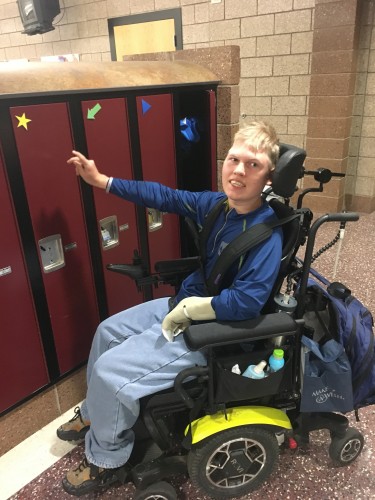

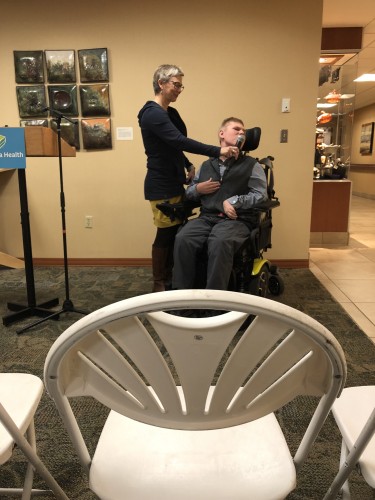
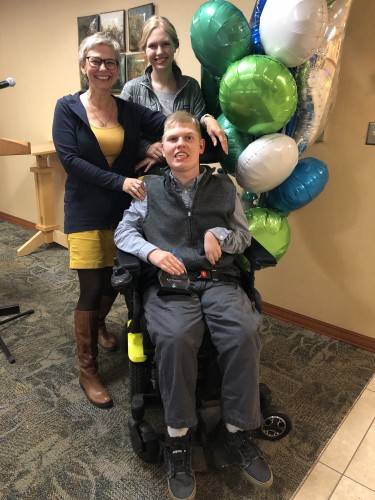
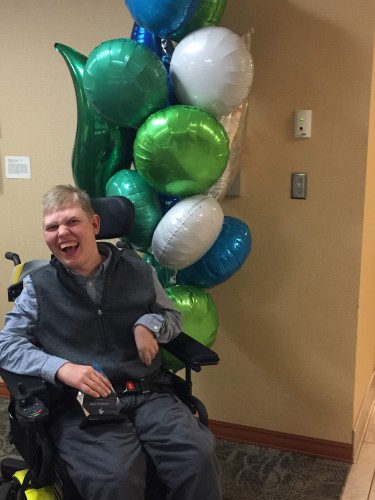
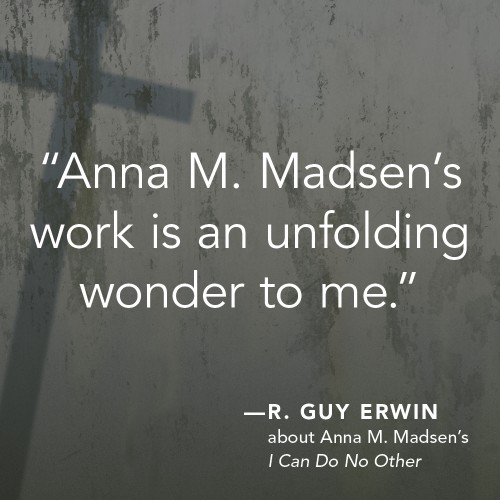
My dad’s rendition of Luther’s theology on vocation was: “find something you love to do, figure out a way to get paid for it”. This does not speak to the injustice that you point out and that our society has created, but I hope Karl finds something he loves to do. Maybe it is up to the rest of us to figure out a way to pay him for it.
Thank you, Dave! Yes, your father’s words can inspire chutzpah to go out and make your way in the world, but it’s simply that sometimes a person needs more than that.
I think it is up to the rest of us, but not just to figure out a way to pay Karl to do what he loves, but to pave the way for him, and for all people with disabilities, to do what he loves.